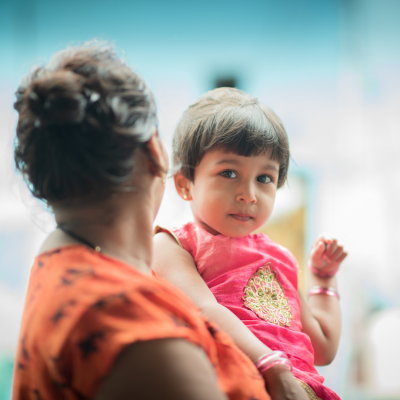
The negative outcomes of stigma against a person — poorer health outcomes, feelings of shame, and isolation — are well understood. But the stigmatized individual may not be the only one experiencing harm.
A nursing-led study has found an association between the HIV-related stigma of mothers in South India and the health of their children who acquired HIV in the womb.
Shunned from their homes and judged by society, such stigma can cause a woman to delay or avoid seeking care, increasing her child’s risk of developing serious complications of HIV, including AIDS.
After examining the data of 108 mother-child pairs with HIV, UCI Sue & Bill Gross School of Nursing PhD candidate Val PhamDo found that the more fearful the mother was of HIV-related stigma, the more her child’s T-cell count was negatively impacted.
T-cells, also known as CD4 cells, are an indicator of the health of the immune system. The lower the count, the more at risk a person is for serious complications of HIV, including AIDS.
Fear was measured by asking mothers questions about different stigma types they were most worried about, on a scale of one through five, five being the highest. Each one-point increase in the overall score was associated with a T-cell decrease of 352 in her child. A normal T-cell count ranges between 500-1500.
Gender-based HIV stigma especially harmful
In India, which has the highest prevalence of HIV in South Asia, social norms, gender inequality and cultural taboos around sexuality have led to barriers to healthcare access that leave women and children most at risk for HIV infection.
Prior studies have identified the harms of gender-based stigma against Indian women with HIV and AIDS. Many women in such studies report neglect and maltreatment by both their spouse and in-laws. When their spouse passes away, they may be shunned from their home.
Indian women living with HIV also receive lower quality care, are more likely to become caregivers to their husbands and are blamed for their husband’s extramarital desires and, ultimately, the husband’s infection.
“Frequently, women are blamed for having HIV, but a lot of times it’s their partners who contract the HIV and give it to them,” notes PhamDo.
When they have children and transmit the infection to them in the womb or through breastfeeding, their children become stigmatized, as well.
“We are lessening the stigma,” PhamDo says. “But because for so long HIV was a death sentence and the things associated with it — drugs, sex work — it’s still there.”
Awareness can lessen stigma
PhamDo says that increased awareness about HIV around the world and improved confidentiality for patients can lead more mothers to seek care in areas where the disease is still highly stigmatized.
Ultimately, she says, that helps their children stay healthy, too.
“Children learn through their parents,” she says. “And their access to health is through their parents.”
More research on stigmatized conditions needed
The study is believed to be the first to link maternal HIV-related stigma with the T-cell count in children who acquired HIV while in the womb.
Study co-author Associate Professor Sanghyuk Shin hopes more studies like this will be done.
“Stigma is not unique to India. It happens everywhere,” he says. “Even in the U.S., where HIV and mental health are stigmatized conditions. That has a powerfully negative impact that has to be looked at.”
The study was co-authored by Distinguished Professor Adey Nyamathi, UCSF Professor Maria Ekstrand and Sanjeev Sinha, professor at All India Institute of Medical Sciences.
Support the UCI Sue & Bill Gross School of Nursing: For more information, to support a future nurse or nurse-led research, please connect to Juliana Goswick, Director of Development at jgoswick@hs.uci.edu.
About the University of California, Irvine: Founded in 1965, UCI is the youngest member of the prestigious Association of American Universities and is ranked among the nation’s top 10 public universities by U.S. News & World Report. The campus has produced five Nobel laureates and is known for its academic achievement, premier research, innovation and anteater mascot. Led by Chancellor Howard Gillman, UCI has more than 36,000 students and offers 224 degree programs. It’s located in one of the world’s safest and most economically vibrant communities and is Orange County’s largest employer, contributing $7 billion annually to the local economy and $8 billion statewide. For more on UCI, visit www.uci.edu




Leave A Comment